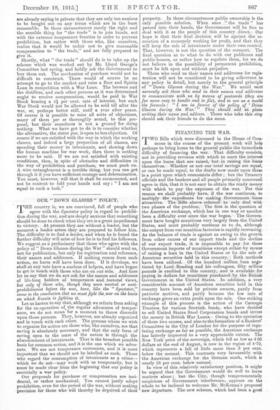OUR " DOWN GLASSES " POLICY.
THE country is, we are convinced, full of people who agree with the Spectator policy in regard to prohibi- tion during the war, and are deeply anxious that something, should be done to check what they see is a great impediment to victory. At present they are without a leader, but the moment a leader arises they are prepared to follow him. The difficulty. is to find a leader, and when he is found the further difficulty will arise of how he is to find his followers. We suggest as a preliminary that those who agree with, the policy, of " Down Glasses during the War " should send us, not for publication, but only for registration and reference, their names and addresses. If nothing comes from such action, no harm will have been done. If it develops, we shall at any rate have a nucleus of helpers, and have begun to get in touch with those who are on our side. And here let us say that we do not ask for the names and addresses of life-long holders of temperance and teetotal views, but only of those who, though they were neutral or anti- prohibitionist before the war, have, like the " Spectator," come to the conclusion that we must fight the, war on the basis on which Russia is fightino it.
Let us hasten to say that, although we refrain from asking, for the co-operation of the regular advocates of temper- ance, we do not mean. for a moment to throw discredit upon those persons. They, however, are already organized and in touch with each other. The persons whom we wish to organize for action are those who, like ourselves, see that saving is absolutely necessary, and that the only form of saving open to the mass of the nation is through the abandonment of intoxicants. That is the broadest possible basis for common action, and it is the one which we advo- cate. We are not temperance extremists, and it is most important that we should not be labelled as such. Those who regard the consumption of intoxicants as a crime— which we do not—may work with us temporarily, but it must be made clear from the beginning that our policy is essentially a war policy. Our proposals for purchase or compensation are inci- dental, or rather mechanical. You cannot justly adopt prohibition, even for the period of the war, without making provision for those who will thereby be deprived of their property. In these circumstances public ownership is the only possible solution. When once " the trade " has passed into their hands, the Government will be free to deal with it as the people of this country direct. Our hope is that their final decision will be against the re- creation of a monopoly working for profit, and that they will keep the sale of intoxicants under their own control. That, however, is not the question of the moment. The final question as to what to do with our publicans and public-houses, or rather how to regulate them, for we do not believe in the possibility of permanent prohibition, must be left open and without prejudice. Those who send us their names and addresses for regis- tration will not be considered to be giving adherence to any policy in detail, but merely to the general principle of ' Down Glasses during the War." We would most earnestly ask those who send in their names and addresses to communicate with us by means of postcards (they are far more easy to handle and to file), and to use as a model the formula : " I am in favour of the policy of ' Down Glasses during the War.' " They should add in plain writing their name and address. Those who take this step should ask their friends to do the same.










































 Previous page
Previous page